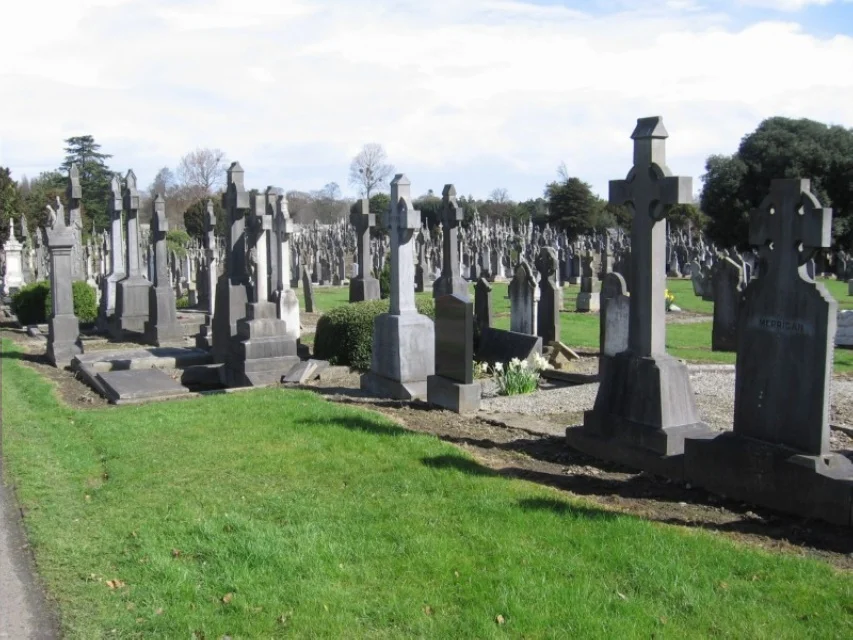Episode 6: Hades
In yellow, the path of the funeral procession, beginning at the Dignam home in the Southeast and ending at Glasnevin Cemetery in the Northwest. (click to enlarge)
As Mr. Bloom has planned all morning, he joins Paddy Dignam’s funeral cortege at 11 am. Together with Martin Cunningham, Jack Power, and Simon Dedalus (Stephen’s father), Mr. Bloom will traverse Dublin by horse-drawn carriage, beginning at the Dignam home in the southeast corner of central Dublin (just east of the Aviva Stadium noted on the Google Earth path to the right), going through the heart of the City Center, and ending at Glasnevin Cemetery in the north).
In Homer’s Odyssey, “Hades” is the land of the dead, to which Odysseus travels in order to learn from the great prophet Tiresias how he might return to his home in Ithaca. Likewise, Mr. Bloom in this episode visits the memories of loved one who have passed away and wrestles with thoughts of his own home, where his wife Molly and her lover Blazes Boylan will meet later this afternoon.
The episode is divided into two parts: first, the conversation between the four men in the carriage (along, of course, with the inner monologue of Mr. Bloom) during the 20 minute journey through town; then, the narrative depicts Dignam’s funeral at Glasnevin (nee Prospect) Cemetery. We gather from the snarling anti-Semitism depicted in this episode that Mr. Bloom is exiled within his Dublin community (which we might juxtapose to Stephen Dedalus’s self-declared exile).
The Dignam home in 1904, #9 Newbridge Avenue
Leaving the Dignam home, Mr. Bloom takes the last of the four seats in the carriage. As the procession through the city begins, Simon Dedalus notices that folks on the road stop and doff their hat out of respect for the deceased. Mr. Bloom spots Stephen Dedalus, “a lithe young man, clad in mourning, a wide hat” (6.39-40), and tells Simon, who launches into a rant about Buck Mulligan, who he fears is corrupting his son. Bloom silently observes Simon’s noisy anger but tolerates the right of a father to be “full of his son” (6.74). Poignantly, Bloom imagines his own son, Rudy, who died at 11 days old just over a decade ago, now as a young man, dressed in an Eton suit beside Molly. He silently mourns this loss, then pivots to thinking positively of his daughter Milly and his fatherhood.
The men in the carriage complain about the rickety carriage supplied by their acquaintance Corny Kelleher, who works for the funeral home. As their inspection of the carriage continues, the men notice crumbs and then, perhaps, unspecified evidence of lovemaking. Mr. Bloom ruminates on diseases and expresses gratitude that Milly wasn’t often ill in her childhood. Seeing an SPCA in the distance triggers the memory of his late father imploring him in his suicide letter to take care of Athos, his dog. It begins to rain, but only briefly.
The men begin to recount with spiteful humor the pontification of Tom Kernan, another acquaintance. In their parody of Kernan’s speech, we see for the first time the phrase “retrospective arrangement,” a term that appears seven times in the novel and may signal Joyce’s own conception of how Ulysses works: there exists in the novel an overarching intelligence (the “Arranger,” as the scholar David Hayman calls it) that knows everything in the book and systematically arranges the details, references, echoes, and revelations in a manner that amplifies the book’s meanings. In essence, the more you know what’s in the book, the more meaningful it is from a perspective of looking backwards with that knowledge in mind (in retrospection). This technique of “retrospective arrangement” is what offers such rich rewards to the re-reader of Ulysses (and, of course, to the re-re-reader, and the re-re-re-re-reader…).
Bloom, as he has done already, goes about the sort of mental accounting we all practice (where did I put that...oh right, in this pocket, and did I remember to…and I need to make sure later to…). He also has creative ideas for inventions and improvements, such as a device that could switch the tram track, but he displays his characteristic compassion by worrying about the impact of the improving device on the livelihood of the worker currently employed in the job then made obsolete by the invention.
He remembers briefly that Blazes Boylan will meet with Molly that afternoon, and, coincidentally, just at that moment the other men in the carriage see Boylan emerging from the Red Bank, a restaurant known for its seafood and, in particular, its oysters (ahem). Looking down anxiously at his nails, Bloom silently questions Boylan’s appeal.
Mr. Power, perhaps with some malice, asks Bloom about the concert tour, and as Bloom begins to speak, Power asks pointedly if Bloom himself will be accompanying Molly on the tour. Depending on how you read these exchanges that occur throughout the day, it may seem that all of Dublin knows what’s going on between Boylan and Molly, and these fellows may seem to enjoy digging the knife into Bloom’s side.
Then, the men notice Reuben J. Dodd, a Jewish moneylender, as the carriage passes him in the street. Simon Dedalus curses him, Mr. Power laughs, and Martin Cunningham suggests that “We have all been there” (6.259), meaning been in debt, then looks at Bloom and corrects himself - “nearly all of us” (6.261). The implication, of course, is that Jewish Mr. Bloom has never owed money to a Jewish money lender.
Eager to disassociate himself from Reuben J. Dodd, Bloom begins to share a bit of recent gossip about Dodd, but he stumbles in his narration, and Martin Cunningham hijacks the story (Dodd’s son fell into the river and Dodd rewarded the boatman who saved him with a gift of 2 shillings - a relatively small sum…roughly $30 today). The other men make sure that Mr. Bloom is kept on the outside of the joke, and the anti-Semitism clouding the air of the carriage remains heavy.
The men turn their attention to Paddy Dignam, celebrating his good humor in life and mourning the suddenness of his death. Dignam died of complications related to his alcoholism, which the men euphemize as a breakdown of the heart. Humane Mr. Bloom finds solace in the fact that Dignam died quickly, with no suffering. However, for Catholics such as Bloom’s companions in the carriage, a sudden death is catastrophic because it affords no opportunity for the sacrament of last rites, whereby the dying person would receive final absolution for sins and the soul prepared for heaven. Mr. Bloom, trying only to be sympathetic, once again finds himself silently ostracized.
A carriage carrying a child-sized coffin passes by their window, and Bloom’s thoughts return to Rudy.
Mr. Power begins to rail against suicide as the worst disgrace, and Simon adds cowardice to the accusations. Martin Cunningham, aware of Bloom’s father’s suicide, sympathetically attempts to thwart this line of conversation. Mr. Bloom considers speaking up, but decides against it and remains silent. He appreciates Cunningham’s compassion and remembers the scene of his father’s deathbed and inquest: the bottle of poison, the yellow streaks on his deceased father’s face, the coroner, the suicide note left for Leopold.
The cortege reaches the north side of the city, close to Bloom’s neighborhood, and they pass by a herd of cattle on the road heading down to the boats for slaughter on Friday (Mr. Bloom knows a bit about the cattle trade from his previous job in Cuffe’s). He offers the idea of running a tramline from the farmland to the boat docks for the cattle, thus clearing the roads of these herds. Martin Cunningham agrees. Seizing on this momentum, Bloom also offers the idea of running a line to the cemetery for funeral trams. After some debate, the men agree with this idea, too, especially since it would eliminate unpleasant scenes of hearse carriages hitting a bump and knocking the coffin out into the road. Bloom imagines such a macabre scene, and Mr. Power points out Dunphy’s pub, where funeral goers customarily stop off for a post-burial drink.
The carriage passes over the Royal Canal (the fourth of four Dublin rivers/canals the carriage crosses, an allusion to Odysseus and the rivers of the underworld. We see for the first time a man standing on a barge (he will subtly reappear later in the novel). Bloom continues to observe the cityscape passing his window, and Mr. Power points out the site of the Childs murder, a famous and enthralling case (one that attracted the attention of 17 year old James Joyce, who attended three days of court proceedings to hear and learn from the superior oratory and rhetorical skills of the attorneys). Bloom returns to his earlier idea of visiting his daughter down in Mullingar and decides he shouldn’t arrive unannounced (for fear that he might catch her with her pants down…).
The funeral procession arrives at Glasnevin Cemetery, and Bloom moves the soap that had made him uncomfortable throughout the carriage ride from his hip to his chest pocket. He notices that the funeral is rather poorly attended and walks behind the other men toward the mortuary chapel.
The narrative perspective shifts from Bloom to the other men ahead as Cunningham informs Mr. Power of Mr. Bloom’s father’s suicide. Power seems genuinely not to have known. Fine. Then we can acquit him of maliciousness, but he’s still guilty of being brash.
Bloom walks behind with Tom Kernan, a Protestant and the subject of the other men’s ridicule earlier in the carriage, and inquires into the state of Paddy Dignam’s finances. Kernan informs that yes, Dignam had life insurance, but he had borrowed against the policy. Bloom is concerned for the well-being of the surviving wife and five children. Bloom then contemplates the loss of a spouse and assumes that Molly would remarry if he passed. Simon Dedalus greets an old friend from his hometown of Cork, who informs him that they are taking up a collection to support the Dignam family until the insurance begins to pay out. Dedalus, broke, dodges the appeal.
The funeral moves into the chapel. Bloom has characteristically pragmatic thoughts about the religious ceremony (the Latin, the holy water, the alter boys, the liturgy, so on). They wheel the coffin out of the chapel and towards the gravesite. Simon nods toward the burial site of his late wife, expresses his readiness to join her in death, and begins to cry quietly to himself.
Mr. Bloom and Tom Kernan, again walking behind the others, comment briefly on the Catholic rituals in which they are unpracticed. Kernan compares the Catholic liturgy unfavorably to the Protestant service, and Bloom thinks about death in its most practical terms: the heart is a pump, and “once you are dead you are dead” (6.677).
As happened a few pages prior with Cunningham and Power, the narrative perspective shifts up a few yards, this time to John Henry Menton, a lawyer and former employer of Paddy Dignam. Menton asks Ned Lambert who Bloom is. Ned replies that Bloom’s married to Molly, with whom Menton fondly recalls dancing and flirting. Menton inquires further, remembering that Bloom used to work for Wisdom Hely’s stationer and that he once quarreled with Bloom over a game of lawn bowling years ago. Lambert tells him that Bloom now works in advertising, and Menton questions why Molly, with all her talent, charisma, and good looks, would have married him.
John O’Connell, the caretaker, joins the funeral and greets the men in attendance cordially, even offering a joke to lighten the mood. Bloom’s mind hops around, from worrying about Molly finding out about his correspondence with Martha, to the amorous activity sometimes surrounding funerals, to the creative idea of burying people upright rather than lying down in order to save space, to the fecundity of the soil in and near a cemetery, to morbid imagination of flesh decomposing beneath the ground. We overhear O’Connell discussing business with Corny Kelleher.
Then we encounter one of the novel’s great mysteries: who is the man in the brown macintosh?
Bloom considers with some gallows humor the moment of one’s death as well as the inevitability of being forgotten to the world as one’s acquaintances likewise die off. Thinking of his own death for a moment, he glances toward the plot on the cemetery grounds he has purchased for his family, where Rudy and his mother are buried (not his father, though; suicides are refused Christian burial). As the gravediggers begin shoveling dirt onto Dignam’s coffin, Bloom panics that perhaps he isn’t actually dead. Maybe they should put a telephone in the coffin? A flag of distress? Just in case?
Joe Hynes, a newspaperman, comes around to get the names of the attendants for the notice. Bloom gives his own and asks Hynes to put down M’Coy, too. Promise kept. There’s a bit of confusion as Hynes asks the name of the man in the brown… “macintosh,” Bloom finishes, and Hynes jots down M’Intosh, mistaking that for the man’s name. Many Joyce scholars and Bloom himself take an interest in solving the mystery of the identity of the man in the brown macintosh (he has seven subsequent references/appearances in the book), and, sure, it is a fun thread to follow, but it seems to me a puzzle intentionally lacking the pieces required for a solution.
The funeral ends. Hynes and Power head over to pay respects at Parnell’s grave, and Bloom walks off himself, thinking about visiting his father’s grave at the end of the month and his obligation to pay the gardener who tends the plot. Bloom considers more interesting information to engrave on tombstones, such as the profession or particular talents of the deceased. He has the staggering thought that all of the people here buried once walked the streets of Dublin, then imagines playing voice recordings of the deceased to keep them in memory. Bloom is halted by a fat, old grey rat toddling over by the crypt and thinks again about decay and what happens to a corpse after death
Approaching the gates of the cemetery, Bloom’s mood lifts in affirmation that he has lots of life left to live. He notices and remembers John Henry Menton, who had earlier noticed and remembered him, and likewise recalls their dispute during the game of lawn bowling. Here, a pun on “the bias” signifies both the curved shot of a weighted bowl and Menton’s anti-Semitic prejudice that produces in him “hate at first sight” (6.1012) toward Bloom.
Bloom observes that there is a dent in the side of Menton’s hat and politely lets him know. Menton reluctantly thanks him, and Bloom falls back, politely avoiding eavesdropping on his conversation with Martin Cunningham.
Bloom concludes the episode with his tolerance for Menton being a jerk and optimism for being alive this morning.






